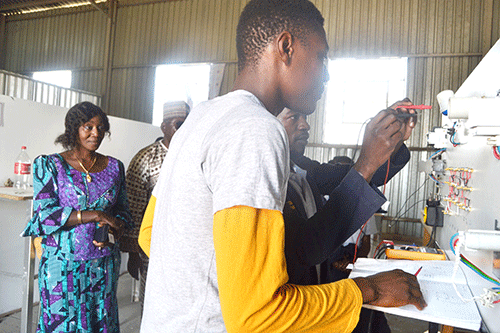KATIMA MULILO – As Namibia continues to import products, such as food, fuel, machinery as well as chemicals, a local expert believes vocational training opens doors to local industrialisation.
Zambezi Vocational Training Centre hotel school manager, Rodger Coetzee told New Era that for Namibia to become an industrial country and compete with developed countries, technical vocational education and training must be the backbone of such realisation.
According to him, studies have shown how countries, such as China, Switzerland and Germany, have become major players in the world economy today, as they are successfully implementing technical vocational education and training (TVET) in their country’s education systems.
“It is important that government aligns and clearly articulates career paths for the Namibian child by including the introduction of technical and vocational training for primary school levels up to exit levels at secondary schools in the national education and training system,” he recommended.
This, he said, will provide a base for stronger economic development, as the Namibian child will have the option to determine his or her future career path from an early age. Sadly, some Namibians continue to unfairly isolate and debase technical and vocational career options. Coetzee said it is unfortunate that technical and vocational training faces such critics in a society that does not realise the opportunities that come with technical and vocational education and training.
Unfortunately, some parents believe that careers, such as doctor, lawyer, accountant, engineer and scientist are good careers, as opposed to careers such as hairdresser, fitter, welder, plumber and chef that could ultimately create jobs.
To this, he disagrees, saying “Without developed infrastructure, doctors, lawyers, accountants, engineers and the likes may be limited to operating at maximum capacity. We have unemployment in the country; there are graduates in these fields without work. Whereas in the technical fields, you can create jobs or even be self-sustainable, as there is continuous demand for services relating to technical specialisation”.
Therefore, he advised that technical training remains the base of development, and parents must consider TVET as the preferred line of career choice, considering the challenges the country is undergoing.
Coetzee encouraged the Namibian youth to take vocational education seriously, adding that the benefits are endless with possibilities of becoming an entrepreneur and competing with international skilled artisans across the globe.
“With discoveries of green hydrogen in Namibia and other possible discoveries, TVET stands at the frontline to grant youth career opportunities through skills development and training towards these discoveries.”
Citing the WorldSkills Africa Competition that Namibia hosted in Swakopmund last year, he said it is an eye-opener that Africa has prioritised TVET as part of their agenda to put not just Namibia on the trade map but Africa at large.
“With debates underway to open Africa up for free trade, it requires our people to be competitive and skilled enough to work anywhere in Africa – should these opportunities be realised,” he recommended.
Minister of Higher Education, Technology and Innovation Itah Kandjii-Murangi is also a proponent of advancing TVET in Namibia, especially since the discovery of green hydrogen, as well as more oil and gas sources.
Shortly after taking a tour of the northern vocational training centres in March this year, she said government is repurposing the tertiary education sector to make it responsive to the emerging skills need by making sure that requisite technical trades at TVET colleges and academic programmes at universities address the required diverse skill sets for green hydrogen, oil and gas, as well as the fourth industrial revolution (4IR) are developed where they do not exist and strengthened where they exist.
She further highlighted that there are two streams of tertiary education: academic and technical.
“Do not confine yourself to one; remember the technical field VTCs give immediate financial freedom the day you graduate and take your tools and put them to work as a self-employed entrepreneur,” she said at the time.
“To our TVET colleges and universities, now is the time for inward reflections on your trade and programme offerings, staff capacity and level of expertise infrastructure and facilities at your disposal.”
Kandjii-Murangi further said she was convinced that through collective efforts, Namibia is in a position to provide jobs for the future. “Namibia must be agile and develop the requisite knowledge, competencies and skills in green hydrogen, oil, gas, 4IR and other possible future fields,” she said.
The minister remarked that Namibian universities and TVET colleges should be positioned to grow fast and develop pools of required experts and technicians in these new economic growth areas.
– anakale@nepc.com.na


